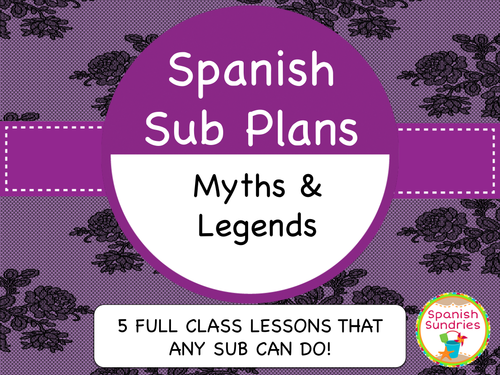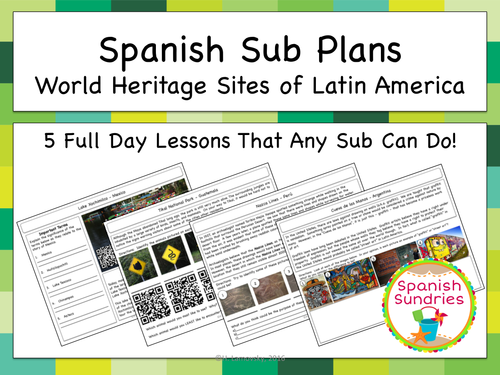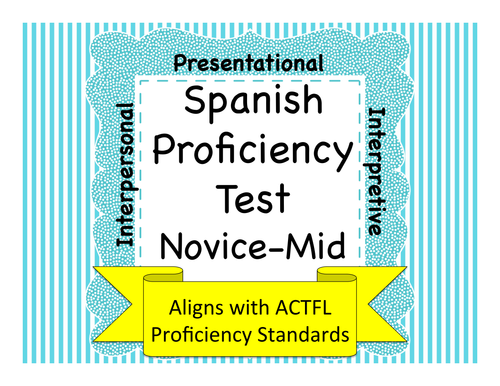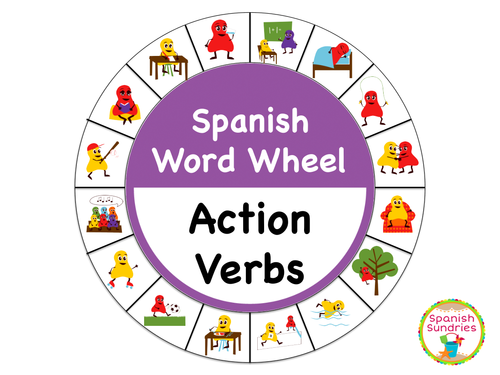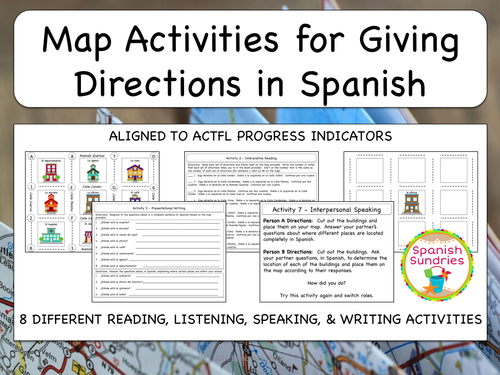
320Uploads
91k+Views
4k+Downloads
All resources

Spanish Proficiency or Placement Test: Intermediate-Low
I developed this assessment as a tool for gathering data as to student's proficiency levels during their third and fourth years of language study in Spanish. This assessment is directly aligned with the ACTFL progress indicators for Intermediate-Low fluency. This assessment addresses all skill areas; Interpersonal Speaking, Presentational Speaking, Presentational Writing, Interpretive Listening, and Interpretive Reading.
This assessment can be used in a variety of ways:
1. As an exit test or final exam for Spanish 3
2. As an entrance exam for Spanish 4
3. As a placement exam for students newly entering your language program from private or out of state institutions
4. As a progress indicator given to students at the beginning, middle, and end of the school year to demonstrate growth
5. As smaller, individual assessments or activities given throughout the course of the school year
This Product Includes:
- Educator's Guide & Instructions for Test Administration
- List of ACTFL Progress Indicators addressed
- Resource Links to ACTFL rubrics and progress indicators
- 6 Activities to assess Interpersonal & Presentational Speaking / Writing
- 4 Activities to assess Interpretive Listening
- 4 Activities to assess Interpretive Reading
- Answer Keys for Listening and Reading Activities
- Answer Keys for Writing activities unless answers may vary

Spanish Writing Prompts
This EDITABLE resource contains 30 writing prompts on topics common to beginning Spanish (level 1 & 2). Prompts are duplicated 2 per page for efficient copying and include the prompt, a word box with useful vocabulary, and writing space.
An interactive table of contents is included to make finding the right prompt for your lesson quick and easy.
These prompts can be used as bell ringers, entrance/exit tickets, or classroom activities. They also can easily be added to interactive notebooks.
Best of all, they are completely EDITABLE so you can adjust the vocabulary to suit your students and use the formatting to add additional prompts as you go.
For a detailed list of each prompt, please see the thumbnail image above.

Spanish Sub Plans: Hispanic Myths & Legends
These Spanish sub plans can be carried out by any sub while you are out of the classroom. Even better, you won't have to feel guilty that your students aren't learning while you are gone!
This set includes 5 full classes of lessons based on Hispanic myths & legends that are ready to print & go, require no technology, do not require the sub to produce any Spanish, and can be differentiated for any level of Spanish class.
Each lesson walks students through the interpretation of legends from around Latin America including the legends of La Llorona, El Silbón, Los Duendes, El Basilisco Chilote, and El Cadejo.
Students will work step by step to interpret the legends through a series of activities that ask them to relate the legends to present day, make cultural inferences about the purpose and origin of these legends, and compare these legends to their own culture and others. Each lesson asks students to think about the legend in the larger cultural context as they make observations and consider some thought provoking questions.

Spanish Sub Plans: World Heritage Sites of Latin America
These Spanish sub plans can be carried out by any sub while you are out of the classroom. Even better, you won't have to feel guilty that your students aren't learning while you are gone!
This set includes 5 full classes of lessons based on various World Heritage Sites of Latin America. Each on is ready to print & go, requires no technology, do not require the sub to produce any Spanish, and can be differentiated for any level of Spanish class.
Each lesson walks students through important and interesting information related to a different UNESCO World Heritage Site and asks them to use higher-order thinking skills, problem solving, and critical thinking skills to understand the culture behind that site.
World Heritage Sites addressed in these lessons include:
-Lake Xochimilco (Mexico)
-Tikal National Park (Guatemala)
-Nazca Lines (Perú)
-Qhapaq Ñan & the Andean Road System (Various)
-Cueva de las Manos (Argentina)
Students will work step by step to learn about each site through a series of activities that ask them to use what they have learned and apply it to the present day, make cultural inferences about the purpose and origin of these sites, and compare these sites to their own culture and others. Each lesson asks students to think about the site in the larger cultural context as they make observations and consider some thought provoking questions.
QR codes are also included in many of the lessons (though not required to use) in case your students need extra support. The QR codes, when scanned, will take them to additional information that will help them complete the activities and understand the lesson.
These lessons are fully aligned with the ACTFL cultural competencies for world language learners and also can be used to address several of the culture themes found on the AP Spanish test.

Spanish Proficiency or Placement Test: Novice-Mid
I developed this assessment as a tool for gathering data as to student's proficiency levels during their first and second years of language study in Spanish. This assessment is directly aligned with the ACTFL progress indicators for Novice-Mid fluency. This assessment addresses all skill areas; Interpersonal Speaking, Presentational Speaking, Presentational Writing, Interpretive Listening, and Interpretive Reading.
This assessment can be used in a variety of ways:
1. As an exit test or final exam for Spanish 1
2. As an entrance exam for Spanish 2
3. As a placement exam for students newly entering your language program from private or out of state institutions
4. As a progress indicator given to students at the beginning, middle, and end of the school year to demonstrate growth
5. As smaller, individual assessments given throughout the course of the school year
This Product Includes:
- Educator's Guide & Instructions for Test Administration
- Resource Links to ACTFL rubrics and progress indicators
- 11 Activities to assess Interpersonal & Presentational Speaking / Writing
- 4 Activities to assess Interpretive Listening
- 3 Activities to assess Interpretive Reading
- Answer Keys for Listening and Reading Activities
- Answer Keys for Writing activities unless answers may vary

Spanish Word Wheels
These printable word wheel focuses on Spanish vocabulary relating to action verbs, animals, parts of the body, parts of the face, numbers 0-15, clothing, colors, food, house, and household chores, sports, and weather. (see thumbnails for specific vocabulary covered)
I have found these to be a versatile tool in the classroom for individual, partner, and large group practice of selected vocabulary.
Word wheels can be used to enhance reading, listening, writing, and even speaking skills. A Guide for Educators with activity ideas is included as well as all printable components of the word wheel. All you will need is paper fasteners (brads).

Los Tres Cerditos Storytelling Mini Unit
This two week long storytelling unit focuses on the story of Los Tres Cerditos (The Three Little Pigs). It can be used with students of all ages to build their skills in the 5 modes of communication and acquire new vocabulary.
Included in this mini-unit are not only the story of Los Tres Cerditos, but also reading, listening, speaking, writing, and assessment activities.
There is also a Guide for Educators which explains each activity and the recommended sequence of instruction.
Included in this Resource:
-Guide for Educators
-Los Tres Cerditos Visual Story Presentation
-Los Tres Cerditos Illustrated Text
-Cloze Listening Activity
-Vocabulary Acquisition Activity
-Story Sequencing Activity
-Reading Comprehension Questions
-Loco Lib Alternate Ending Activity
-Interpersonal Speaking Partner Activity - (2 Versions)
-Illustration Only Pages for Story Re-Telling

GIANT Spanish Culturopoly Board Game
The second of our GIANT Board Games, Culturopoly focuses on teaching students about the important people, products, and places of the countries of Mexico, Spain, Guatemala, Puerto Rico, Ecuador, Panama, Costa Rica, Cuba, Peru, Chile, Argentina, and Venezuela. This is a great whole-class game that transforms the floor of your classroom into a giant board game.
With a style of game play similar to Monopoly, students travel around the game board collecting cultural facts about the various countries. Once they gather enough facts, if they land on a "maleta" space, they can answer some trivia questions about a particular country in order to earn a "boleto de ida y vuelta". The team with the most "boletos" at the end end of the game wins.
The best part of this game is that it is easily adaptable to any age group and proficiency level. With three different difficulty levels (Easy, Medium, Hard), it is perfect for an exploratory or Latin American Studies class all the way through an upper level Spanish class. While the Easy mode allows for students with no knowledge of Spanish, the Medium mode starts to introduce target language terms for students with minimal Spanish language proficiency, and the Hard mode focuses on play completely in the target language.
This is a great way to review for culture portions of midterm or final exams, or for any day that you just need something different. In the future, there will be expansion packs to add different Spanish-speaking countries to the game. Either way, any teacher will get a LOT of use out of this one game.
This Resource Includes:
-Complete Set-up and Game Play Instructions for each mode
-Fifty 8 1/2 x 11 Game Spaces with pictures representative of cultural items
-12 Boletos de Ida y Vuelta (one per country)
-12 Easy Difficulty Country Challenge Cards w/ answer keys
-12 Medium Difficulty Country Challenge Cards w/ answer keys
-12 Hard Difficulty Country Challenge Cards w/ answer keys
-36 Culture Fact Cards

Digital World Language Teacher Planner
This Digital Planner for World Language Teachers is really two planners in one! All forms in the planner are fillable for digital safe-keeping, but they are also printable if you prefer to keep them in a binder or hand off completed forms as documentation for your department head or administration.
The "Classroom Manager" features everything you need to keep your class organized and collect documentation for yourself or as part of a teacher evaluation program.
The "Classroom Manager" includes:
-Teacher Schedule
-Substitute Teacher Forms
-Parent Contact Log
-Student Accommodation Sheets (IEP, 504, TAG)
-Teacher Evaluation Program Organizer
-To-Do Lists
-Student Behavior Log
-Hall Pass Log
-Month by Month Calendar
The "Lesson Planner" focuses on helping World Language teachers plan instruction using research-based methods. Whether you are currently using a textbook or designing your own units, this planner will help you to effectively sequence your instruction as well as balance activities through the various modes of communication (listening, reading, writing, speaking). This will even help remind you to include culture and real-life applications for the content you teach.
The "Lesson Planner" includes:
-Resource Links to the Best Websites for Language Teachers
-Monthly Cultural Calendars
-Formal Lesson Plan Template
-Pre-Planning Activities
-Lesson Planning Mantra
-Assessment Planning
-Thematic Vocabulary Planning
-Listening & Reading Resource List
-Speaking & Writing Resource List
-Cultural Connection Resource List
-First Week Lesson Day by Day
-Second Week Lesson Day by Day
-Feedback & Reflection
Essentially, this planner includes everything a new or experienced World Language Teacher will need to stay organized all year long. This planner will be updated yearly with new calendars and information based on the feedback I receive from real World Language Teachers.

Spanish Sub Plans: Festivals of Spain
These Spanish sub plans can be carried out by any sub while you are out of the classroom. Even better, you won't have to feel guilty that your students aren't learning while you are gone!
This set includes 5 full classes of lessons based on various festivals that take place in Spain. Each on is ready to print & go, requires no technology, do not require the sub to produce any Spanish, and can be differentiated for any level of Spanish class.
Each lesson walks students through important and interesting information related to a different Spanish festival and asks them to use higher-order thinking skills, problem solving, and critical thinking skills to understand the culture behind that tradition.
Spanish Festivals in these lessons include:
-La Tomatina (Buñol)
-Las Fallas (Valencia)
-Semana Grande (Bilbao)
-Cristianos y Moros
-Bizarre Spanish Festivals
Students will work step by step to learn about each celebration through a series of activities that ask them to use what they have learned and apply it to the present day, make cultural inferences about the purpose and origin of these traditions, and compare these events to events in their own culture and others. Each lesson asks students to think about the festival in the larger cultural context as they make observations and consider some thought provoking questions.
These lessons are fully aligned with the ACTFL cultural competencies for world language learners and also can be used to address several of the culture themes found on the AP Spanish test.

Spanish Making Plans Unit
This ACTFL-aligned unit is designed to teach Novice-High (Spanish 2/3) students to make plans, accept/reject invitations, and make excuses in Spanish.
The unit includes more than 10 different activities based on all modes of communication including interpretive reading/listening, presentational speaking/writing, and interpersonal speaking.
This Product Includes
- Guide for Educators
- Vocabulary List
- Invitation Reading Station Activity based on authentic Spanish language invitations
- Text Message Reading Station Activity
- Making Plans Conversation Puzzles
- Interpretive Reading Assessment
- Video Listening Activity
- Interpersonal Speaking Activity
- Making Plans Speaking Prompts (also available separately)
- Role Play Scenarios
- Answer Keys for all Objective Activities

Spanish Comparisons Unit / Los Comparitivos
This unit is designed to walk students through the use of comparisons in Spanish in some of the most commonly used ways. This resource includes a variety of activities to help students master comparisons or equality and inequality when applied to real-life situations and common uses of comparisons.
Students will practice comparing age, physical appearance/personality, food, and classes. There is also a good amount of culture embedded in the unit both through activities focused on typical foods of Spain / Latin America as well as within the other contexts.
This unit is designed to be used with Novice-Mid to Intermediate-Low level students. Many of the activities are self-differentiated to allow for use with a wide variety of students.
This Download Includes the Following Resources
-Age Comparison speaking activity
-Comparison Reading Activity
-Age Comparison Writing Activity
-Food Comparison Activity
-Authentic Shopping Ad Comparison Activity
-Authentic Supermarket Ad
-Comparing People Activity
-Food Comparison Activity 2
-Taste Test Activity
-Culture Comparison Activity - A Week of Groceries Around the World
-Cultural Comparison Activity - School Lunches Around the World
-Food Comparison Speaking Activity
-Authentic Foods/Beverages Power Point Presentation
-Authentic Foods Guided Note Sheet for Students
-Assessment (listening, reading, culture, writing)
-Writing Idea Bank for Students
-Vocabulary List with Helpful Vocabulary for comparing foods
-Answer Keys for all Objective Activities

Giving Directions in Spanish Unit
The activities included in this unit will help students to both understand and give driving directions in Spanish. Also included are several activities to teach or review describing the location of a place using directional phrases.
Following this unit, students should be able to meet the following ACTFL progress indicators for Novice-High learners:
-Ask for directions to a place
-Tell someone how to get from one place to another
-Tell someone where something is located
-Give simple directions to a nearby location
-Understand if someone is asking for directions
This unit includes recommended vocabulary as well as 8 different activities centered around the included town maps. The activities focus on all modes of communication including interpretive listening/reading, presentational writing/speaking, and interpersonal speaking. Many of the activities are hands on and allow students to manipulate visuals as they learn. The materials included can be used in a variety of ways throughout many levels of Spanish coursework.
This product includes:
-Guide for Educators
-Vocabulary List
-2 Maps
-Map Cards
-2 Reading Activities
-2 Listening Activities
-2 Writing Activities
-2 Speaking Activities
-Answer Keys for all Objective Activities
-2 Interactive Power Point Activities



